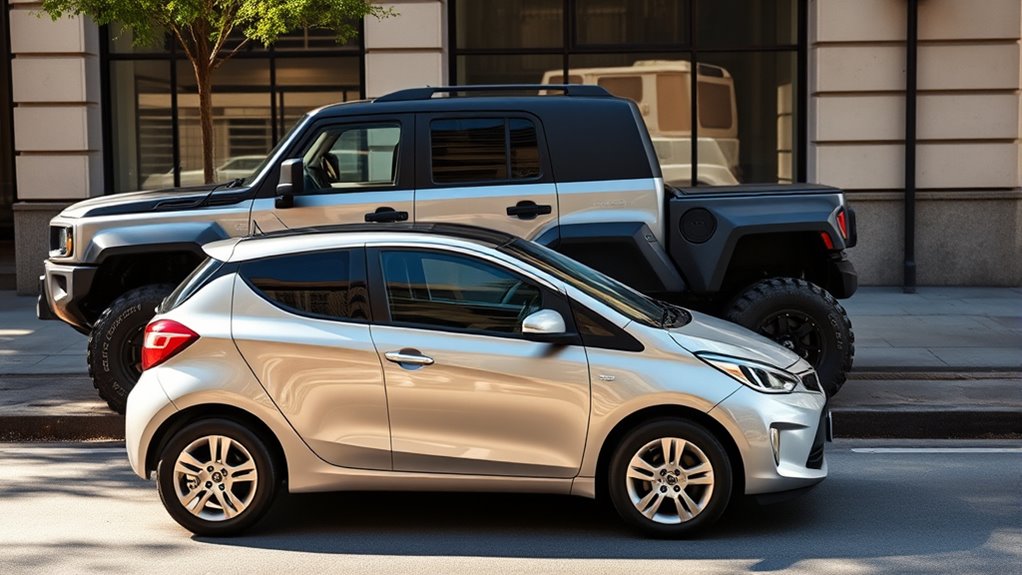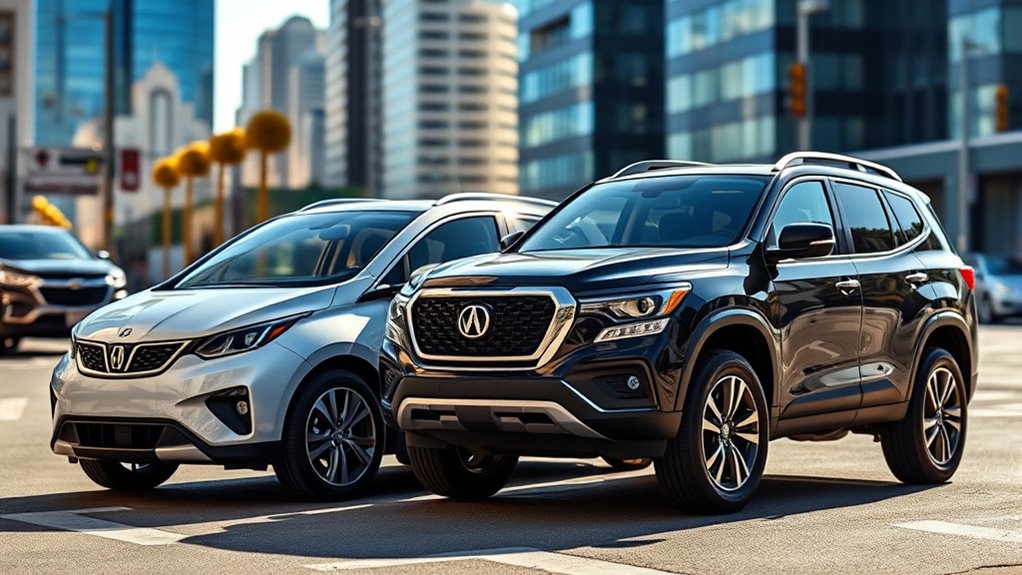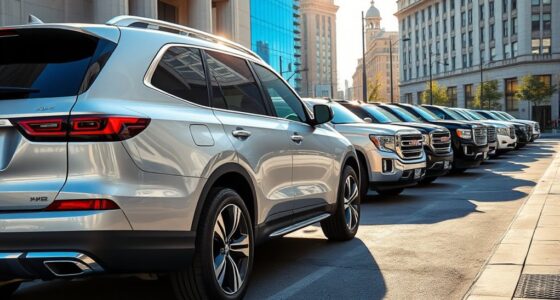If you’re seeking better lease deals, compact cars usually come out ahead, especially for daily commuting and budget-conscious drivers. They tend to have lower monthly payments, are more affordable overall, and electric models can be particularly cost-effective thanks to incentives and lower fuel costs. SUVs offer more space and versatility but typically come with higher lease prices. To discover which option suits your needs and budget, keep exploring the options available and potential benefits.
Key Takeaways
- Compact electric cars typically have lower monthly lease payments and better incentives than SUVs.
- Leasing compact models is more affordable upfront, making them attractive for budget-conscious consumers.
- SUVs often offer more leasing promotions, especially on luxury and newer models, but come with higher costs.
- Electric compact vehicles benefit from tax credits and rebates, enhancing overall lease value.
- Overall, compact cars generally provide better lease deals due to lower purchase price and maintenance costs.

When choosing between a compact car and an SUV, you need to contemplate your priorities, driving habits, and lifestyle. If you’re looking for a vehicle that’s easy to maneuver through city streets and tight parking spots, a compact car often makes the most sense. They’re generally more affordable to lease, and many models now come as electric vehicles, which can markedly boost fuel efficiency and reduce your environmental impact. Electric compact cars are especially appealing if you want to save on fuel costs and avoid the hassle of gas stations, making them a practical choice for daily commuting. Plus, their smaller size means lower maintenance costs and less wear and tear over time. Additionally, electric compact cars often feature low maintenance, which can further reduce ownership expenses over the vehicle’s lifespan.
On the other hand, if you need more space for family, cargo, or outdoor adventures, an SUV might be the better option. While they tend to be pricier, leasing an SUV can still be attractive because many manufacturers are now offering competitive lease deals, especially on newer models. SUVs often come with advanced safety features and a commanding view of the road, which can boost confidence during long trips or rough weather conditions. If you prioritize versatility, an SUV can handle everything from grocery runs to weekend getaways with ease.
Fuel efficiency is a critical factor when comparing these options. Compact cars, especially electric vehicles, typically deliver superior fuel economy, saving you money in the long run. Many electric compact models have a range that suits daily needs and can be charged at home or at public stations, reducing fuel expenses substantially. Conversely, traditional SUVs tend to consume more fuel, but recent models have made strides in improving efficiency. Some hybrid SUVs now offer a middle ground, providing decent fuel economy while maintaining the space and utility of larger vehicles.
Lease deals also vary between these classes. Compact cars, especially electric models, often have lower monthly payments and incentives aimed at promoting eco-friendly driving. Leasing an electric compact can also include benefits like tax credits or rebates, making them more affordable. SUVs may have higher payments but often come with more leasing options and promotions, especially for newer or luxury models. The decision ultimately hinges on what you value most—cost savings, environmental impact, or space and utility.
Frequently Asked Questions
How Do Lease Terms Differ Between Compact Cars and SUVS?
When comparing lease terms, you’ll notice that compact cars often have shorter lease durations, typically around 24 to 36 months, with lower mileage limits suited for city driving. SUVs usually offer longer lease periods, like 36 to 48 months, and higher mileage allowances for more extensive travel. Your choice depends on your driving needs, but understanding these differences helps you find a lease that fits your lifestyle and budget.
Are There Specific Credit Requirements for Leasing Compact Versus SUV Vehicles?
Ever wondered if leasing a compact or SUV has different credit score requirements? You’ll generally find that both types have similar leasing eligibility criteria, with a good to excellent credit score often needed. Lenders look for strong credit scores to approve leases and secure favorable terms. While some dealerships might offer options for lower scores, your credit score directly influences your leasing opportunities and the terms you’ll qualify for.
What Are the Typical Maintenance Costs for Leased Compact Cars Compared to SUVS?
You’ll find that maintenance costs for leased compact cars are generally lower than for SUVs. Compact cars usually require less tire replacement and brake maintenance because they’re lighter and have smaller tires and brake systems. SUVs, on the other hand, tend to cost more in these areas due to their size and weight. Regular upkeep like tire replacement and brake maintenance is essential, but expect higher expenses with SUVs over the lease period.
How Do Insurance Rates Compare for Leasing Compact Cars Versus SUVS?
Insurance premiums for leasing compact cars are often lower than for SUVs, like a gentle breeze versus a gusty wind. SUVs tend to have higher insurance rates because of their larger size and increased crash risk. When comparing, check safety ratings—higher ratings can lower premiums. Ultimately, your costs depend on the vehicle’s safety features, your driving history, and the insurer’s policies, so shop around for the best deal.
Are There Special Incentives or Rebates Exclusive to Either Class?
You should know that special incentives and rebates often vary by vehicle class. Dealers sometimes offer exclusive dealer incentives on SUVs to boost sales, while manufacturer rebates might be targeted at compact cars to promote fuel efficiency. Check with your dealer or manufacturer to see current offers, as these incentives can markedly lower your lease costs. Staying informed helps you take advantage of the best deals available for either class.
Conclusion
When choosing between a compact and an SUV, consider your priorities: Is it affordability, versatility, or space? Both classes offer compelling lease deals, but only you can decide which suits your lifestyle best. Will you prioritize fuel efficiency or cargo capacity? Will you opt for a smaller, easier-to-park vehicle or a larger, more comfortable ride? Whichever you choose, make sure it aligns with your needs, your budget, and your driving dreams.










